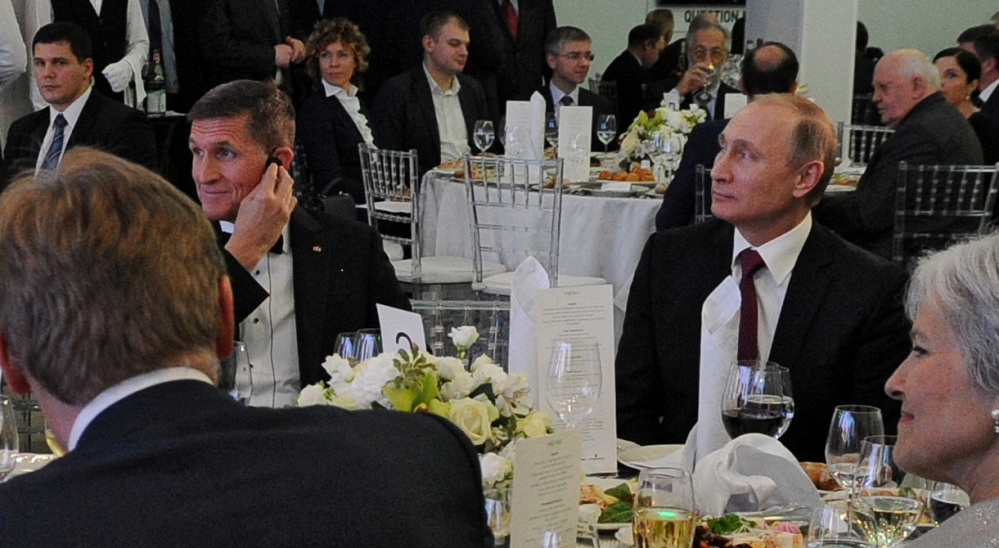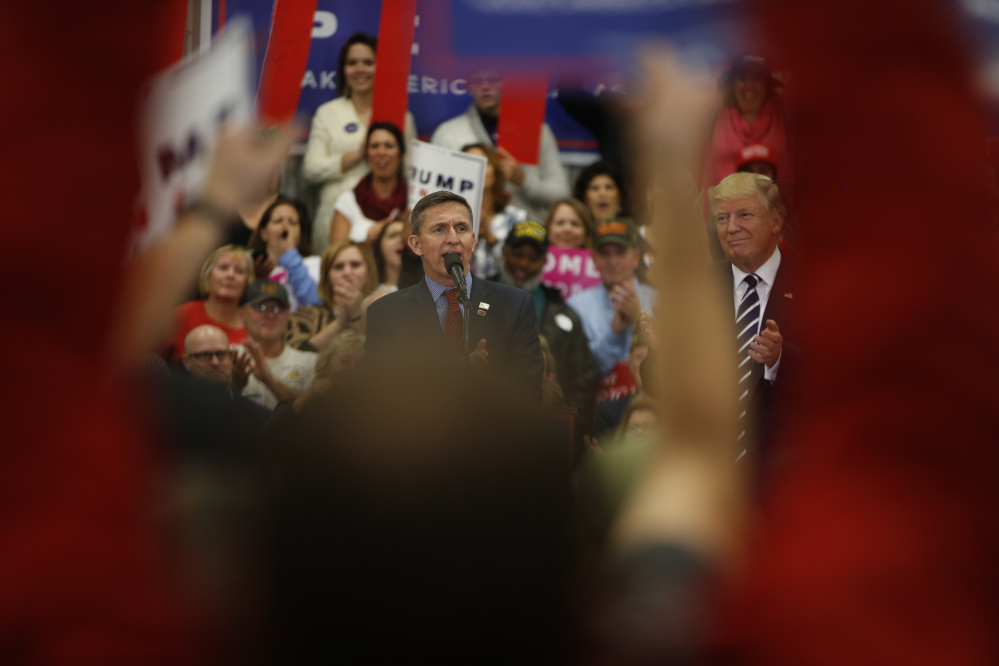WASHINGTON — President Trump’s ouster of national security adviser Michael T. Flynn, and the circumstances leading up to it, have quickly become a major crisis for the fledgling administration, forcing the White House on the defensive and precipitating the first significant breach in relations between Trump and an increasingly restive Republican Congress.
Even as the White House described Trump’s “immediate, decisive” action in demanding Flynn’s resignation late Monday as the end of an unfortunate episode, senior Republican lawmakers were buckling under growing pressure to investigate it.
And The New York Times reported Tuesday that U.S. agencies intercepted phone calls last year between Russian intelligence officials and members of Trump’s 2016 campaign team.
The Times reported that the Russians made contact with Paul Manafort, who briefly served as Trump’s campaign chairman. In late August, Manafort resigned from that job after disclosures by The Associated Press about his firm’s covert lobbying on behalf of Ukraine’s former pro-Russia governing party.
Current and former U.S. officials interviewed by the Times declined to identify other Trump associates contacted by the Russians.
The anonymous officials told the Times they found no evidence that the Trump campaign was working with the Russians on hacking or other efforts to influence the election.
Senate Majority Leader Mitch McConnell, R-Ky., said Tuesday that it is “highly likely” that the events leading to Flynn’s departure will be added to a broader probe into Russian meddling in the U.S. presidential election. Intercepts showed that Flynn discussed U.S. sanctions in a phone call with the Russian ambassador – a conversation topic that Flynn first denied and then said he later could not recall.
McConnell’s comments followed White House revelations that Trump was aware “for weeks” that Flynn had misled Vice President Mike Pence and others about his talks in late December with Russian Ambassador Sergey Kislyak.
White House counsel Don McGahn told Trump in a briefing late last month that Flynn, despite his claims to the contrary, had discussed U.S. sanctions imposed on Russia by the Obama administration in late December, press secretary Sean Spicer said Tuesday. That briefing, he said, came “immediately” after Sally Yates, then the acting attorney general, informed McGahn on Jan. 26 about discrepancies between intercepts of Kislyak’s phone calls and public statements by Pence and others that there had been no discussion of sanctions.
McGahn then conferred with Yates the following day, Jan. 27, to try to glean more information, according to two officials familiar with the conversations who spoke on the condition of anonymity because they were not authorized to speak publicly.
Within the White House, the matter was viewed skeptically and Trump and McGahn for several days remained among the few people who were briefed, they said.
It was not until a Washington Post report Thursday, in which Flynn was quoted as saying that he had no “recollection” of discussing sanctions but couldn’t be sure that he hadn’t, that the slide culminating in Monday’s firing began, several administration officials said.
“We’ve been reviewing and evaluating this issue with respect to General Flynn on a daily basis for a few weeks, trying to ascertain the truth,” Spicer said at the daily White House press briefing. He emphasized that an internal White House inquiry had concluded that nothing Flynn discussed with the Russian was illegal, but that he had “broken trust” with Trump by not telling the truth.
When asked whether Trump told Flynn to talk to Kislyak about sanctions, Spicer responded: “No, absolutely not.”
Asked why Trump had waited nearly three weeks to act after what Spicer called a “heads-up” from the Justice Department, he said once the question of legality was settled, “then it became a phase of determining whether or not (Flynn’s) action on this and a whole host of other issues undermined” Trump’s trust. He declined to specify the “other issues.”
In an interview early Monday and published Tuesday by the Daily Caller, Flynn said that he did not specifically discuss sanctions with Kislyak, but rather then-President Obama’s simultaneous expulsion of 35 Russian diplomats. He said he told the ambassador that “we’ll review everything” following Trump’s inauguration.
Current and former U.S. officials have said, however, that much of the conversation was about sanctions, and that Flynn suggested that Moscow not respond in kind to the expulsions – advice that Russian President Vladimir Putin took in declining to take retaliatory action.
Although Trump has not publicly offered his view of the sanctions, Spicer said the president “has made it very clear he expects the Russian government to de-escalate violence in the Ukraine and return Crimea,” even as he hopes to cooperate with Putin on terrorism.
Various accounts of the Flynn saga offered by White House officials in recent days have added to confusion about how the administration viewed Flynn’s actions, who knew what and when they knew it.
News accounts about a Flynn-Kislyak conversation in late December – the day before Obama announced new sanctions related to Russian election interference – first surfaced in a David Ignatius column in The Washington Post on Jan. 12. Asked the next day whether they had talked about the sanctions in light of Trump’s campaign and post-election pledges to better relations with Russia, White House officials said the subject had not been discussed.
Three days later, Pence told CBS’s “Face the Nation” that Flynn had assured him personally there was no conversation about sanctions. Spicer offered similar assurances in a subsequent White House briefing.
On Jan. 24 or 25, based on discrepancies between comments by Pence and Spicer and what they knew from regular intercepts of Kislyak’s calls, FBI agents interviewed Flynn. Details of that interview, first reported Tuesday by the New York Times, are unknown but they could expose Flynn to possible charges if he denied that he had discussed sanctions with Kislyak. That interview was followed by the Justice notice to McGahn, who immediately informed Trump and others, officials said.
After Trump ordered McGahn to review the matter, Spicer said, he quickly concluded that Trump’s “instinctive” conclusion that the discussions were not illegal was correct. But some in the White House who had long distrusted Flynn began to contemplate his departure.
Flynn was eventually made aware of the White House investigation, which led to alarm among senior Trump aides when he initially told The Post, in a Feb. 8 interview, that there had been no discussion about sanctions. He revised his remarks to the paper the next day, saying through a spokesman that “while he had no recollection of discussing sanctions, he couldn’t be certain that the topic never came up.”
The two accounts were published by the Post on the evening of Feb. 9.
“His story remained the same until that night,” Spicer told reporters in his office on Tuesday evening. “There was a story in The Post where there’s a White House official that says that he could not recall. . . . Whatever that quote was is what matters. … His story remained the same until that night.”
Pence spokesman Marc Lotter told reporters that the vice president first became aware of the “incomplete information” Spicer had provided him by reading the same newspaper account.
Flynn was then questioned by McGahn, Pence and Chief of Staff Reince Priebus, who the official said was so frustrated that his tone became more that of a litigator than a colleague.
After discussing the situation throughout the weekend at Trump’s Florida resort, a final decision was made on Monday night by Trump, along with Priebus and senior advisers Steve Bannon and Jared Kushner, to tell Flynn to resign, officials said.
That is a notably different version of events than the one offered Monday night, when administration officials characterized Flynn’s departure as voluntary. One senior White House official said Monday that Trump had not fired Flynn but that he had made the decision to resign on his own because of “the cumulative effect” of damaging news coverage.
Send questions/comments to the editors.




